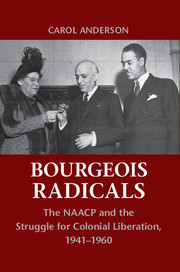Book contents
- Frontmatter
- Dedication
- Contents
- List of Figures
- Acknowledgments
- Introduction De-Centering Du Bois
- 1 Rising Wind
- 2 “The White Man’s Burden Has Not Been Very Heavy”
- 3 “An Even Larger Issue Than ‘Containing Communism’”
- 4 So Weak, So Seventeenth Century
- 5 Regime Change
- Conclusion Beyond the Single Story
- Bibliography
- Index
- References
Introduction - De-Centering Du Bois
Published online by Cambridge University Press: 05 December 2014
- Frontmatter
- Dedication
- Contents
- List of Figures
- Acknowledgments
- Introduction De-Centering Du Bois
- 1 Rising Wind
- 2 “The White Man’s Burden Has Not Been Very Heavy”
- 3 “An Even Larger Issue Than ‘Containing Communism’”
- 4 So Weak, So Seventeenth Century
- 5 Regime Change
- Conclusion Beyond the Single Story
- Bibliography
- Index
- References
Summary
I’m for truth, no matter who tells it. I’m for justice, no matter who it’s for ... or against.
– Malcolm XNearly a decade ago, while beginning the archival research for this book, I happened to run into historian Gerald Horne at the Library of Congress. We chatted a bit and then he asked me what I was working on. I said, “The NAACP’s anticolonialism.” He smiled and half jokingly replied, “Well, that’s going to be a short book!”
Horne would have been right, if the archival record confirmed the orthodoxy that has reigned for more than forty years. The standard, accepted saga is straightforward. The National Association for the Advancement of Colored People’s (NAACP) anticolonialism began and ended with co-founder W. E. B. Du Bois, whose second stint at the Association was only four brief, tumultuous years, 1944–1948. In that short space of time he brought an enormous wealth of insight, experience, and intuitive brilliance to the subjects of colonialism, economic exploitation, and Africa. His intellectual and anticolonial light was so bright – blinding almost – that it has appeared to many scholars that when he left the NAACP, he took the fire and the sun with him. All that remained of the Association was a darkened, desiccated husk. The NAACP was just a shell of what it used to be and certainly a mere shadow of what it could have been. The ouster of Du Bois, these scholars contend, not only hobbled and destabilized the Association’s anticolonialism but also had a disastrous effect on the struggles for liberation in the United States.
- Type
- Chapter
- Information
- Bourgeois RadicalsThe NAACP and the Struggle for Colonial Liberation, 1941–1960, pp. 1 - 9Publisher: Cambridge University PressPrint publication year: 2014



